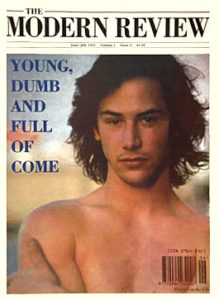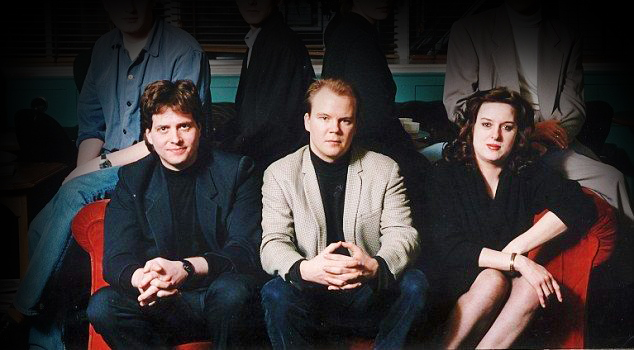Cosmo Landesman Toby Young and Julie Burchill (The Modern Review)

You could have knocked me down with a feather when I read in the Evening Standard last month that “legendary Nineties hellraiser magazine Modern Review” is making a comeback. It was the first I’d heard of its return since I closed it down in 1997. “Burchill won’t be involved,” a source confirmed, which is probably for the best. It won’t be anywhere as good as my one.
This month marks 30 years since the first publication of the Modern Review, the magazine which I co-founded with Toby Young, my then soulmate, and Cosmo Landesman, my then husband. Toby was a teenager when I met him in 1984, his academic family living next door to Cosmo’s in Islington. When I abandoned my first marriage and small son at the age of 24 to elope with Cosmo, I promptly annexed Toby as my amigo-in-chief. (We were such a close threesome that my son, Jack, was blessed with the middle name Tobias.)
It all started on a sunny spring day in 1990; as we queued for a rollercoaster at Thorpe Park, Cosmo and Toby were talking about Intellectual Stuff while Jack and I — both video game addicts — chattered away about Mario. When Toby joined our conversation, I remember marvelling at his ability to one minute bang on about the Frankfurt School and some bird called Theodora Dorno, and the next do an impression of Bart Simpson. It occurred to me that he was a new type of person — as much concerned with Baywatch as Beowulf — who needed a new type of magazine. And so we started to plot: “I’ll be boss because I’m the rich one and Toby, you’ll be the editor because you’re the clever one.”
It certainly helped that I was loaded. Sometime in the Eighties, in my late 20s, I was earning more than the Prime Minister and the Chancellor combined, simply by writing for newspapers and magazines. Then I pocketed an advance of £100,000 to write a smutty novel about a girl reporter on the make, called Ambition. But there’s only so much cocaine a person can take — and even after I gave away a not insignificant proportion of my earnings to charity every month, there was still quite a bit left, so I started us off with a few thousand.
A saintly patron since my impoverished teenage days, Peter York, declared his willingness to invest — and John le Carré sent us a cheque too. But it was tireless Toby who did the legwork; after a year of begging letters he amassed £16,666.50 — just £1,983,333.50 short of his £2 million target.
Toby used to say that he had “negative charisma”; he’d walk into a room and everyone would loathe him. Cosmo told me that he’d given Toby the classic anti-hero novel What Makes Sammy Run — and Toby read it as a users’ manual rather than a cautionary tale. But I never saw that: I adored him. He was full of life — more exuberant than anyone I’d ever met. So I wasn’t surprised when he gathered around him a coterie of very clever youngsters who got it completely.
LOW CULTURE FOR HIGHBROWS was our strap-line; inside our first issue of Autumn 1991 our two-page mission statement was accompanied by images of Bart Simpson and Roland Barthes. “Imagine if FR Leavis was editing Smash Hits!” I said at the time.
The run-up was very dramatic — as Toby put it a decade ago: “We couldn’t afford a laser printer, so the literary editor, who also happened to be the assistant arts editor of the European, sneaked us into Robert Maxwell’s newspaper emporium and showed us how to use the equipment. When Maxwell found out he applied for an injunction against the magazine and, when that failed, pursued us through the courts for damages.” On the eve of the court case, which would have without doubt bankrupted us, Maxwell went for a midnight swim — and we were off.
I didn’t keep anything from those days, but Cosmo still has a collection of old copies, including an ironic “home-shopping catalogue” supplement that features a Julie Burchill doll, basically a Barbie dressed in black with dark hair: “Pull the string and she tells you how much she earns.”

The covers and headlines were funny and forthright – “KEANU REEVES – YOUNG, DUMB AND FULL OF COME”; “WHY PRINCE CHARLES MAKES ME SICK” (Guess who by?); DI HARD: WHY DIANA IS OUR POP PRINCESS; (Me again!) POSH SPICE – IS SHE FUCK!; WAZZA MAZZA WIZ GAZZA? (David Runciman — now a distinguished academic.)
Our writers were brilliant and diverse. Nick Hornby before he was famous. The eternal enigma that is Ian Penman, who I chased down and snogged into submission. A review by one of the Velvet Underground — Sterling Morrison — of a book about the Velvet Underground. A very amusing ongoing column by Cheers writer Rob Long of conversations with his agent. A young Louise Doughty, now a famous novelist, visited D.M. Thomas for writing tips and found a dirty old man. Mark Steyn took down the untouchable Dennis Potter; Richard Littlejohn took a hatchet to the hypocrisy of the broadsheet newspapers and their parasitical relationship with the tabloids.
There was an ongoing column — so pertinent now — called If I Ran The BBC, written variously by Garry Bushell, Mariella Frostrup and Quentin Crisp. See what I mean by diverse? Today, when the word is deployed by the likes of the BBC, it just means people of various hues and sexualities all saying the same thing on everything from the importance of breakfast to the horridness of Brexit.
As for me, when I wasn’t drooling over pop stars half my age, I was getting into massive squabbles with academics. The best one, with Professor Camille Paglia, ending with me elegantly advising her to “Fuck off, you crazy old dyke”, became such a classic spat that it remains plastered over the internet — sadly, unlike the rest of our wonderful publication.
From a starting circulation of 5,000, we were soon up to 30,000 — not a lot, but imagine if there’d been Google back then! When one of our journalistic heroes, the brilliant James Wolcott of Vanity Fair, came to London to write a profile of us, we couldn’t believe our luck. But a few years down the line (or lines, considering the amount of coke I was keeping my young Stakhanovites going with) all was not tickety-boo between Toby and myself.
Perhaps we had just been too close not to combust, like a passionate love affair. The New Lad fad had arrived, and as someone who’d been a feminist since the age of 12, when I shoplifted The Female Eunuch, I didn’t want us associated with it — we were too good for that.
Take Elizabeth Hurley. I thought she was a smasher, and was delighted when she agreed to read excerpts from Ambition as a free giveaway with the magazine. But I was starting to feel I knew her nipples better than my own. She obviously felt the same and upon hearing that Toby was planning to publish some revealing photographs of her, hired a scary law firm to dissuade him. Quite right too. “We’re not bloody Loaded!” I snarled at him.
But it was to be another vamp who put an end to our phenomenal fun. Toby mentioned that he had met — and slept with — a girl called Charlotte Raven and was employing her as an editorial assistant. Her name alone thrilled me, and when I heard that her dad was rich, and discovered that we had a pleasant time in bed — mostly at Blakes Hotel — I decided on a whim that I wanted her to be editor instead.
Toby, understandably, closed the magazine down in the summer of 1995. Charlotte compared him to Hitler, which is when I started to go off her. Our relationship was never going to last; I had my eye on her younger brother within three months, whom I’m still married to after a quarter of a century.
But I think the Modern Review would have folded within the year anyway. We were victims of our own success; all the broadsheets started to poach our writers. As John Harris of the Guardian put it: “Out of all proportion to its meagre resources, it soon comprehensively redrew the cultural map, forever wiping the high-cultural smirk from the face of Britain’s critics.”
What happened to this silly lot of self-important kids? I’m still looking for trouble — and finding it — at the age of 62. Cosmo wrote an excellent book called Starstruck in 2009. Charlotte has a terminal illness; her book Patient 1 is published in November. Toby did the best of all of us; now founder and director of the Free Speech Union.
Could the Modern Review happen today, in this weak world of echo chambers, cry-bullies and cancel culture? I suspect not. We no longer live in a time when two people can be rude to each other without running to the authorities. I feel sorry for the brightest kids of today, desperately wanting to be journalists but terrified that one unconventional thought might find them finished before they’re started.
As for me and Toby and Cosmo and my bright little boy Jack, whose beautiful mind was eaten alive by madness and who took his own life six years ago, we’ve all lost a lot along the way in the 30 years since we queued up, waiting for thrills. But we’ll always have that rollercoaster.










Join the discussion
Join like minded readers that support our journalism by becoming a paid subscriber
To join the discussion in the comments, become a paid subscriber.
Join like minded readers that support our journalism, read unlimited articles and enjoy other subscriber-only benefits.
Subscribe